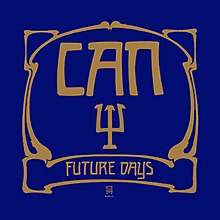Songs
The track "Future Days" opens with a minute of abstract electroacoustic music, which builds into a Latin-tinged groove that languidly cruises through a "turbulent, undulating course". Michael Karoli, Can's guitarist, had a concrete video imagery of "Future Days" as a space story with "a sort of Jules Verne spaceship, a nineteenth century spaceship". "Future Days" has notes of melancholy and the disillusionment heard on "Doko E" from Unlimited Edition , which expresses Damo Suzuki's negative feelings from his recent trip to Japan. The song manifests a picture of a "daily existence that feels empty of meaning, a life postponed".
The shimmering, scouring texture, reminiscent of buzzing cicadas, was created by "overloading the organ through the Farfisa's rotating speaker, processed with the Alpha 77, with extra gating in the mix." Another sound was created as a looped recording of crunching cushion from Can's studio. Holger Czukay integrated an editing trick for the song's coda, looping a segment of the rhythm track at double speed.
The instrumentalism of "Spray", while masterfully performed, doesn't sound "showy or professionalised; the drums played by Jaki Liebezeit hurtle headlong with minimal loss of energy". The drums are "forever in motion" and don't land squarely on a backbeat but "relentlessly ricochet off the pulse in seething drifts". It has been compared to Miles Davis's Bitches Brew and Isaac Hayes's Hot Buttered Soul . [20]
"Moonshake" has been identified by Can's biographer Rob Young among the "Can catalogue of perfectly formed pop songs", alongside "She Brings the Rain" from Soundtracks and "Sing Swan Song" from Ege Bamyasi . It introduces "elements of rock convention and erasing any sense of cliché around them".
Karoli, when working on "Bel Air", was inspired by his recent oceanside vacation. He added an echo effect to his guitar to get a feeling of the cliff's outlines, overlapped with a progression of strong and softer chords. Schmidt, in turn, "got the exact sound of the wind which was blowing in the house where Karoli was staying". Schmidt recalled: "Everybody played very soft and we had headphones on, whoever was at the mixer didn't want to bring the sound up because we would have heard that and it would have disturbed the atmosphere so he didn't dare to move the controls. Thus it got a lot of tape noise," which pretty much starts off the piece. Another highlight for Schmidt was the fact that he had to "listen, and never interfere" embodying a "just one big ear, looking stunned to my fingers". Can integrated a field recording of a bird in a meadow, which "took pains" for Schmidt to locate in the WDR's sound library.
